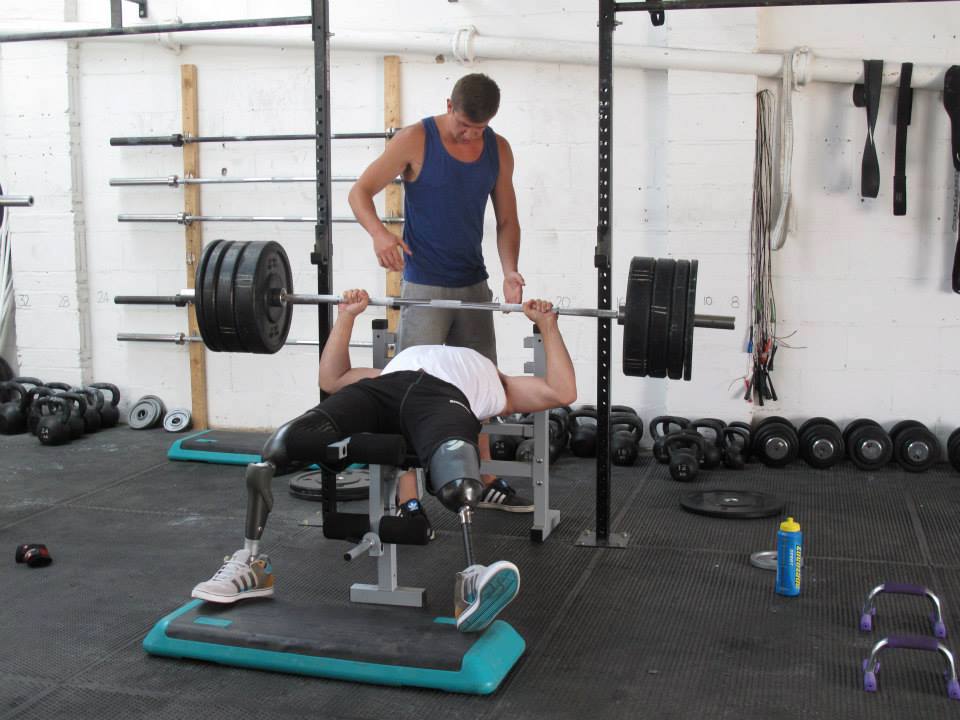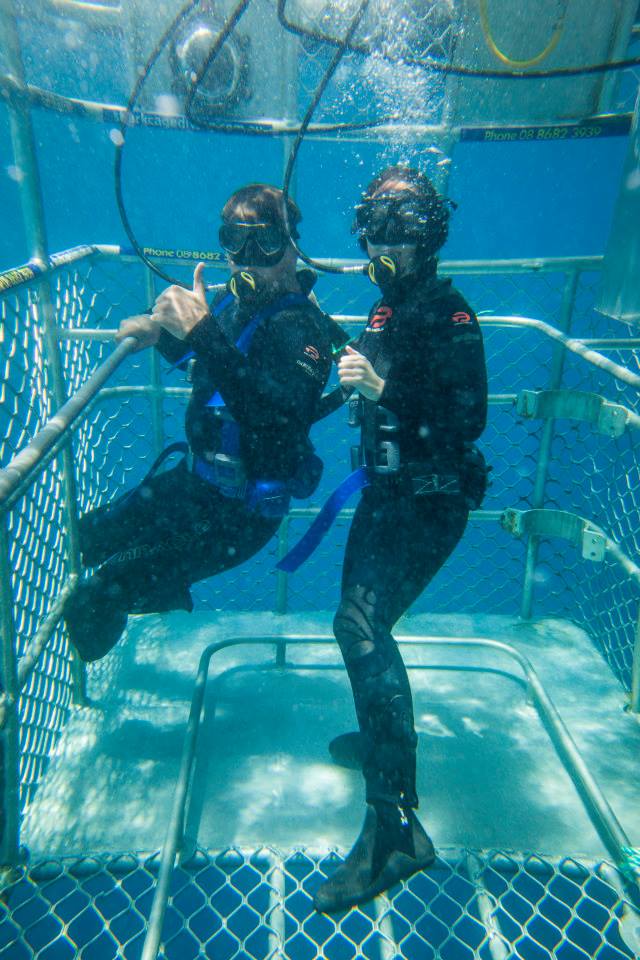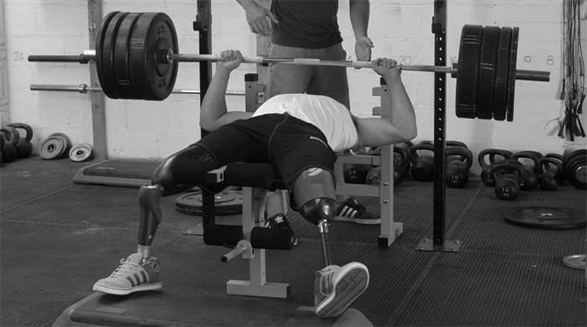Meet Ben Stoten – the shark-diving, weight-lifting double amputee
DtL: Hi Ben, Could you tell us a bit about your story so far?
Ben: On February 3rd 2012, as I was going to the aid of another soldier who had been wounded in Afghanistan, I was caught by an improvised explosive device. I awoke three weeks later in Birmingham, having been put in an induced coma, to find that both my legs had been amputated. In addition to this I sustained a broken upper left arm, swollen lungs (from the shockwave of the blast) and as a result, I was unable to breathe without a life-support machine. Sadly the comrade I had tried to help, passed away six weeks later from his injuries.
It took three months before I was able to leave the hospital and enter rehabilitation, where an amazing team spent a year teaching me how to walk using prosthetic legs. I was introduced back into the world of fitness and found the gym extremely therapeutic and calming – the competitive side of me also loved making improvements each week.
Since then, I have gone on to open my own business, settle down and also start my journey to becoming a personal trainer! My mission is to inspire other people like me to move forward in a positive way, and use the gym as a form of therapy.
DtL: Do you think that the media has a negative impact on young people in terms of body image and self-confidence?
Ben: I think the media can’t help but play a major part in the formation of peoples’ views – especially those of the young and impressionable. We are exposed on a daily basis to advertisements and programmes which contain seemingly ‘perfect’ people and this leads to feelings of inadequacy. We need more diverse role models in mainstream media to represent the population at large.
DtL: What are your most prominent challenges, and how do you overcome them?
Ben: I guess just navigating the world as an amputee – things that you wouldn’t have ever thought about as an able-bodied person. For example, if I am going somewhere new, I have to plan the whole visit – even if it is only to a new restaurant! Although I am very good at walking in prosthetics, I have to check if there are stairs, and if there are, I have to check if there is a rail available that I can prop myself up with as I cannot simply descend a staircase like everyone else does. I also need to know how steep they are too as I have been caught out before and it can be embarrassing – for example there have been occasions where I have needed to swap tables with people or sometimes abandon the visit altogether.
Come winter I dread snow being forecasted as I cannot walk on it without slipping and falling over – and when it rains I have to be careful too! I mean, sometimes it’s hard as an able-bodied person to stay upright in those weather conditions!

DtL: Have you ever experienced bullying? If so how did you deal with the experience?
Ben: Like most people, I first experienced bullying at school. I changed secondary schools due to my parents separating, and joined halfway through a term when everyone else had already established their friendship groups. It was tough. It started with kids throwing things at me in class and then gradually escalated to name-calling, boys shoving me in the playground and then eventually, full on fights. It was never just one person either – I always had to face a group of three boys or more at a time – I think because I was quite tall. There was a ring-leader, who puppeteered the others, as in often the case.
Even though I was only young, I took comfort in the fact these boys felt the need to ‘gang up’ on me, as they were obviously too scared to face me alone. I decided to take up boxing and learn to defend myself – it turned out to be one of the best decisions I ever made. If nothing else, I learnt how to block and duck the punches coming my way. However, they soon started to try and use this new hobby of mine against me – they’d say things like ‘Come on, hit us Ben’, ‘Use your boxing skills Ben’. I had been taught by my trainer to only resort to fighting if it was absolutely necessary, but it did get to the stage where they attacked me in such a way I felt the need to retaliate physically. I would never advocate violence as a way of solving issues, but what that experience taught me, was to face your problems head on – deal with them – because they won’t simply ‘go away’.
DtL: Our research found 63% of those with a physical disability are far more likely to experience extreme bullying and social exclusion. What advice would you give to any of our readers who may be experiencing bullying or feel like they don’t fit in/ doubt themselves because of attitudes towards a disability?
Ben: Firstly, accept yourself as you are – disability and all. Be happy and confident in your own body, as it is only then that you can start to overcome the boundaries and fears that hold us back in life. If you are experiencing bullying – talk to someone and try and deal with the problem at hand – or, bypass them altogether! By that I mean work on you, find a hobby that you love and the friends will follow. Remember that what you are going through won’t last forever – things will get better.

DtL: What is the most exciting thing you’re working on at the moment?
Ben: Training to become a qualified personal trainer! The industry is saturated but I am lucky (so to speak) in that I have a unique angle; having a military background and being an amputee, I am hoping to turn my passion into a career. Alternatively, I would like to work in a rehab centre with people such as myself, and pass my experiences onto others!
DtL: If you could go back in time, what one thing would you tell your younger self?
Ben: I would tell myself to turn left instead of right in Afghanistan for obvious reasons BUT that aside, I would tell myself not to sleep in too much and enjoy life for what it is! I am no longer able to get up in the early hours of the morning and go for a run, or play football, and I realise now how many days I wasted sleeping in bed as a teenager!
DtL: What is it like to be an amputee in 2016? Have you faced any challenges/ prejudice that you didn’t receive before? If so how have you dealt with them?
Ben: It’s not too bad – most places now cater for disability within reason. The army provided me with an exceptional level of care despite some media outlets saying otherwise. Conversely, it is thanks to the media that the profiles of injured servicemen have been raised. Events like the Paralympics have also helped spread awareness; I know a lot of friends who have tuned in and been in awe of what the competing athletes have achieved. Slowly, I think the stigma and stereotypes are ceasing to exist.
DtL: We want to challenge existing perceptions of masculinity to inspire young boys to seek support and talk about their feelings. Can you name one thing that is not traditionally masculine about you?
Ben: Unlike traditional gender stereotypes – I am incapable of anything DIY related. My partner does those kinds of jobs around the house and tells me how bad I am at them. I’m also very partial to a bath bomb – I like to chill out and relax – but when shop assistants’ see me browsing, they assume I am buying for my wife. They are very wrong.
DtL: Is there anything you would like to add?
Ben: If you are having a tough time, and you are experiencing bullying, please don’t keep it to yourself – it makes such a difference to air your problems – contact Ditch the Label! I also suggest, to those who have a disability, to seek out others with a similar disability. Remember you are not alone! The world is a big place full of unique people, making a connection with those that are in a similar situation to you will be comforting and help you find your motivation!
Follow Ben on Instagram @amputeeswholift













